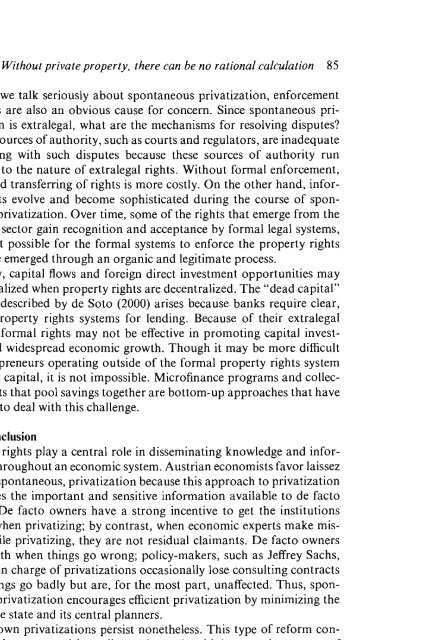Handbook on Contemporary Austrian Economics
Handbook on Contemporary Austrian Economics
Handbook on Contemporary Austrian Economics
Create successful ePaper yourself
Turn your PDF publications into a flip-book with our unique Google optimized e-Paper software.
Without private property, there can be no rati<strong>on</strong>al calculati<strong>on</strong> 85<br />
When we talk seriously about sp<strong>on</strong>taneous privatizati<strong>on</strong>, enforcement<br />
problems are also an obvious cause for c<strong>on</strong>cern. Since sp<strong>on</strong>taneous privatizati<strong>on</strong><br />
is extralegal, what are the mechanisms for resolving disputes<br />
Formal sources of authority, such as courts and regulators, are inadequate<br />
for dealing with such disputes because these sources of authority run<br />
c<strong>on</strong>trary to the nature of extralegal rights. Without formal enforcement,<br />
titling and transferring of rights is more costly. On the other hand, informal<br />
rights evolve and become sophisticated during the course of sp<strong>on</strong>taneous<br />
privatizati<strong>on</strong>. Over time, some of the rights that emerge from the<br />
informal sector gain recogniti<strong>on</strong> and acceptance by formal legal systems,<br />
making it possible for the formal systems to enforce the property rights<br />
that have emerged through an organic and legitimate process.<br />
Finally, capital flows and foreign direct investment opportunities may<br />
not be realized when property rights are decentralized. The "dead capital"<br />
problem described by de So to (2000) arises because banks require clear,<br />
formal property rights systems for lending. Because of their extralegal<br />
status, informal rights may not be effective in promoting capital investment<br />
and widespread ec<strong>on</strong>omic growth. Though it may be more difficult<br />
for entrepreneurs operating outside of the formal property rights system<br />
to obtain capital, it is not impossible. Microfinance programs and collective<br />
efforts that pool savings together are bottom-up approaches that have<br />
surfaced to deal with this challenge.<br />
6.4 C<strong>on</strong>clusi<strong>on</strong><br />
Property rights playa central role in disseminating knowledge and informati<strong>on</strong><br />
throughout an ec<strong>on</strong>omic system. <strong>Austrian</strong> ec<strong>on</strong>omists favor laissez<br />
faire, or sp<strong>on</strong>taneous, privatizati<strong>on</strong> because this approach to privatizati<strong>on</strong><br />
recognizes the important and sensitive informati<strong>on</strong> available to de facto<br />
owners. De facto owners have a str<strong>on</strong>g incentive to get the instituti<strong>on</strong>s<br />
"right" when privatizing; by c<strong>on</strong>trast, when ec<strong>on</strong>omic experts make mistakes<br />
while privatizing, they are not residual claimants. De facto owners<br />
lose wealth when things go wr<strong>on</strong>g; policy-makers, such as Jeffrey Sachs,<br />
who are in charge of privatizati<strong>on</strong>s occasi<strong>on</strong>ally lose c<strong>on</strong>sulting c<strong>on</strong>tracts<br />
when things go badly but are, for the most part, unaffected. Thus, sp<strong>on</strong>taneous<br />
privatizati<strong>on</strong> encourages efficient privatizati<strong>on</strong> by minimizing the<br />
role of the state and its central planners.<br />
Top-down privatizati<strong>on</strong>s persist n<strong>on</strong>etheless. This type of reform c<strong>on</strong>tinues<br />
to be supported by policy-makers who think a certain amount of<br />
c<strong>on</strong>trol and hierarchy is necessary. Despite the popularity of top-down<br />
privatizati<strong>on</strong>, the value of sp<strong>on</strong>taneous privatizati<strong>on</strong>s may so<strong>on</strong> be realized<br />
in parts of the world desperately in need of bottom-up privatizati<strong>on</strong>, such<br />
as sub-Saharan Africa, since the mixed results of neoclassical privatizati<strong>on</strong>

















